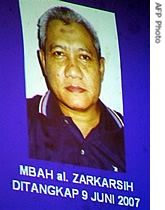2007年VOA标准英语-Indonesian Police Arrest Leader of Southeast As(在线收听)
Hong Kong
15 June 2007
Indonesian police have arrested the head of the Southeast Asia terrorist network Jemaah Islamiyah (JI) along with its military leader in a major blow to an organization that has been blamed for a series of deadly bombings. VOA's Nancy-Amelia Collins in Jakarta has more.
Indonesia's anti-terrorist team announced the arrest of Zarkasih.
 |
| This reproduction picture taken in Jakarta, 15 June 2007 shows a photo of Zarkasih, also known as Mbah, believed to be the head of Southeast Asian extremist network Jemaah Islamiyah (JI) |
Zarkasih says his appointment as JI leader was rushed because a crackdown by police, who have arrested at least 300 militants, had crippled the group.
Earlier this week, police announced the capture of Abu Dujana who led JI's military wing. In a separate videotape, Abu Dujana confessed his role in the terrorist organization. He says Zarkasih appointed him the head of the military wing in 2005.
Since 2002, JI has been blamed for bombings on the Indonesian resort island of Bali, an attack on the JW Marriott Hotel in Jakarta, and a bombing outside the Australian embassy in Jakarta. The attacks killed more than 240 people, many of them foreign tourists.
JI also is thought to be responsible for several bombings in the Philippines.
After the first Bali bombing in 2002, the government began to crackdown on the group, which wants to create a pan-Islamic state in Southeast Asia.
Among the top figures arrested several years ago were Abu Rusdan and Abu Bakar Bashir, both whom police say once headed JI.
Abu Rustan was jailed for only two and a half years after being convicted of shielding a known terrorist. Abu Bakar Bashir, who was found guilty for being part of a conspiracy behind the 2002 Bali bombings, had his conviction overturned upon appeal in 2006.
Sidney Jones is the Southeast Asia director of the International Crisis Group, which studies terrorism and political risk. She says Zarkarsih, who is commonly known as Nuaim, has been with JI since its inception in the late 1990's. She says the arrests of Zarkarsih and Abu Dujana are a significant blow to the organization but does not its spell end.
"I think it means that certainly the leadership is going to be in very serious disarray," Jones said. "I don't think it means the end of JI but it certainly is going to go through a period of pretty serious confusion."
Jones says the capture of the two leaders also increases the police's chances of capturing another most wanted JI figure, Noordin Top. He is a Malaysian citizen thought to be a key figure behind the bombings in Indonesia.
Noordin is believed to have formed a violent splinter group intent on launching more attacks after the group fractured following disagreement over the killings of civilians.